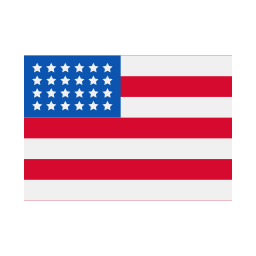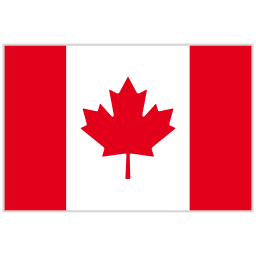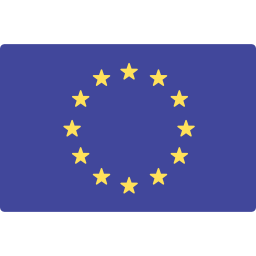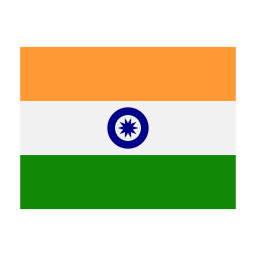LATVIA- GENERAL INFORMATION

GEOGRAPHY
Located off the Gulf of Riga on the Baltic Sea, the Republic of Latvia shares a border with Lithuania to the southwest, Russia to the east, Belarus to the southeast and Estonia to the northeast. Latvia’s 25,499 square-mile territory is divided into five regions. The northern region is known as Riga; Vidzeme and Latgale are the western regions and the eastern regions are Kurzeme and Zemgale. About 12,000 rivers run through a landscape that is mostly flat plain grasslands with dense forest and low hills found in the east. The country’s longest river is the Daugava which runs through Riga. Latvia’s coastline is split with about half on the Gulf of Riga and the other half on the Baltic Sea.
HISTORY
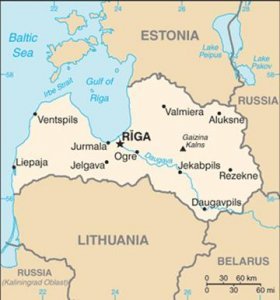
The people of Latvia trace their roots to Baltic tribes who arrived during medieval times between the 8th – 12th centuries A.D. The region fell under the control of many empires including the Germans, Poles, Swedes and Russians. After World War 1, Latvia declared itself a republic but was then annexed by the USSR in 1940. Although most countries including the U.S. did not recognize the annexation, it wasn’t until 1991 that Latvia could declare its official independence after the fall of the Soviet Union. The last of the Russian troops left in 1994, but a Russian minority of around 26% of the population remained in Latvia. Latvia joined the EU and NATO in the spring of 2004.
THE PEOPLE
Centuries of colonization and settlement from Germanic and Scandinavian tribes have influenced the culture of Latvia. Most people of Latvia are Lutheran and Catholic followed by a large minority of Russian Orthodox. Strong influences from Polish and Russian culture can be found especially in Latgale (eastern Latvia). Education for this society is of high importance.
SOCIAL CONVENTIONS
It is common to find several generations living in the same home together. Grandparents and the elderly are looked after in their later years and may help with raising younger children. Latvians can be reserved and formal but are very hospitable. Handshaking is customary when meeting someone for the first time. They can be quite direct, but do not generally mean to cause offence. Latvians are proud of their culture and visitors should respect their strong national identity.
LANGUAGES
Latvian is the official language. Russian, English and German are widely spoken. Latvian belongs to the Baltic language group, part of the Indo-European language family. The language has three main dialects with Latgallian dialect spoken in the eastern part of Latvia.
GOVERNMENT
Parliamentary republic
TIME ZONE
UTC + 2 – (observes summer daylight savings time)
ELECTRICITY
230V supply voltage and 50Hz
Plugs and Sockets Type F
CLIMATE
Wintertime may include heavy snowfall and can be very cold between the months of November through March. April too can still be as low as 40 Fahrenheit. Spring and autumn experience moderate weather and mild conditions while summers are a bit warmer. Rain occurs year around and peaks during the month of August. A slight difference in weather may occur between the western Latvian coastal maritime climate and the eastern continental climate.
Clothes to Wear:
The warmer months are May, June, July, August, September and October. It can rain throughout the year, so you may want a light raincoat. We usually don’t recommend traveling long distances with an umbrella. If you feel you need an umbrella, rather purchase one overseas. Pack some smart layered clothing. Even in summer the weather can be on the cooler side on occasion.
From November it turns colder and wetter. Snow is possible. January and February are the coldest months. Pack some warm, layered clothing. Even in the summer months of June, July and August, on occasion it can be cool on some days and in the evenings. Clever layering is the key to dressing for changeable weather.
LOGISTICAL
Entry & Exit Requirements:
Latvia is a party to the Schengen Agreement. Visit the embassy of Latvia website for the most current visa information. For US and Canadian residents who are not US or Canadian citizens (green-card-holders) with foreign passports please consult https://www.schengenvisainfo.com/ for correct European Union visa rules.
- Passports should be valid for at least six months beyond your planned date of departure. You will be denied entry if your passport is not valid for at least three months.
- If you plan to stay in Latvia more than 90 days, you must apply for temporary residence.
- A criminal records check from the United States, which can be requested through the FBI, is required for a temporary residence permit. You must also submit proof of identity and a set of ink-rolled fingerprint impressions.
- The U.S. Embassy cannot take your fingerprints, but the Latvian State Criminal Police Department is able to provide this service at Bruniniekuiela 72, Riga, tel: 371 6720-8662. For more information, contact the Latvian Embassy at 2306 Massachusetts Avenue NW, Washington, D.C. 20008, tel: (202) 328-2840, fax: (202) 328-2860.
- You should carry your passport when travelling to neighboring Baltic countries from Latvia – even on day trips – as random passport checks are possible.
HIV/AIDS Restrictions: The U.S. Department of State is unaware of any HIV/AIDS entry restrictions for visitors to or foreign residents of Latvia.
Embassy Locations:
SamneraVelsaiela 1
Riga LV-1510
Latvia
Telephone: +(371) 6710-7000
Emergency After-Hours Telephone: +(371) 6710-7000 or +(371) 2920-5708
Fax: +(371) 6710-7001
Email: askconsular-riga@state.gov
Canada Embassy Riga
20/22 Baznicas Street, 6th Floor
Riga, LV-1010
Latvia
Telephone: +(371) 6781-3945
Fax: +(371) 6781-3960
Email: riga@international.gc.ca
Health:
The U.S. government does not pay medical bills and U.S. Medicare is not valid overseas.
The quality of medical care in Latvia continues to improve, but often falls short of Western standards. Latvia has highly trained medical professionals, but hospitals and clinics still suffer from a lack of equipment and resources.
- Many doctors speak at least limited English.
- There are few private clinics in major cities that offer services equal to Western European or U.S. standards.
- If you are elderly or you have health problems, you may be at increased risk.
- Western-quality dental care can be obtained in Riga.
- Payment is expected upon admission at private hospitals
Prescription Medicines: Pharmaceuticals sold in Latvia are produced by companies certified in accordance with EU standards, but may not necessarily be labeled the same as in the United States.
Medical Insurance: Make sure your health insurance plan provides coverage overseas. Most care providers overseas only accept cash payments. See the Embassy of Latvia’s website for proof of health insurance requirements.
We strongly recommend supplemental insurance to cover medical evacuation.
The following diseases are prevalent:
- Tick-borne encephalitis (TBE)
- Lyme disease
- If you intend to visit parks or forested areas (even within Riga), you are urged to speak with your health care practitioner before traveling.
- Tick-borne encephalitis and Lyme-disease are widespread throughout the country. Use CDC recommended insect repellents containing either 20%
- DEET, picaridin, oil of lemon eucalyptus or IR3535 to help diminish bites from ticks and other insects if you intend to visit parks or forested areas.
- Tick-borne encephalitis vaccinations are given as a series of three doses, and are not available in the United States.
- There are no vaccines against Lyme disease.
- Hepatitis A is a significant health concern in Latvia. Hepatitis A vaccine is available in the US and is recommended for those with prolonged stays or travel in rural areas.
- Tuberculosis is an increasingly serious health concern in Latvia.
Vaccinations: Be up-to-date on all vaccinations recommended by the U.S. Centers for Disease Control and Prevention.
Information on vaccinations and other health precautions, such as safe food and water precautions and insect bite protection, may be obtained from the Centers for Disease Control and Prevention’s (CDC) hotline for international travelers at 1-800-CDC-INFO (1-800-232-4636) or via the CDC website at http://wwwnc.cdc.gov/travel. For information about outbreaks of infectious diseases abroad, consult the infectious diseases section of the World Health Organization (WHO) website at http://www.who.int/topics/infectious_ diseases/en/. The WHO website also contains additional health information for travelers, including detailed country-specific health information.
BANKS & CURRENCY
Currency is in Euros. Most traditional credit cards are accepted at hotels, restaurants and shops. Banking hours are Monday – Friday 9:00am – 5:00pm.
COMMUNICATION
Country code: 371
Internet country code: .lv
Cell Phone Usage:
Please contact your cell phone provider to determine whether your contract includes coverage in the country you are visiting. Depending on your contract you may have to add international services and/or country specific services.
ENTERTAINMENT
Food & Drink:
Latvian cuisine has been influenced by its surrounding countries and is mostly based on meat and local produce. The most popular meat is red meat, usually served as a patty, cut up into stews or fried with breadcrumbs. Fish delicacies, especially smoked, are more common for areas along the coast. Herring is often pickled and served cold. Vegetables and sauerkraut (Latvian version) are traditional dishes along with potatoes, usually in the form of potato salad.
The drinking age is 18, however, in places like Riga, drinking or possessing an open bottle of alcohol in the streets or other public areas is forbidden and may lead to a hefty fine. There are several local beers and Riga’s Black Balsam, which is a thick, black alcoholic herbal drink. It has been around since 1700. Wild berry fruit juices are also quite common.
Nightlife:
From pubs and bars to nightclubs with DJs or relaxed hangouts, Latvia has a lot to offer for nighttime entertainment. Most of the popular clubs and bars are in the city of Riga including its famous Skyline Bar with a 360-degree view of the capital. Other cities including Daugavpils, Liepaja and Ventspils have places to enjoy a drink or hangout but may cater a bit more to locals.
Shopping:
Souvenir shopping is best in Riga, with the main market held in zeppelin hangers. Several large shopping centers can be found in the city. Many surrounding areas have their own specialties. Woodwork can be found in areas in and around Sigulda. Those visiting Cesis can find traditional Latvian jewellery, while Latgale is a place you can find lots of pottery making.
BAGGAGE
Baggage rules for international and domestic air travel have changed much in recent years, differ from carrier to carrier and these days even may cover your on-board bags. Checking luggage may cost a separate fee or may be free depending on your personal status with the carrier. We therefore encourage you to read your ticket’s small print and/or contact your carrier for exact rules.
TIPPING
Most restaurants and bars already include a 10% service charge in the bill. It is customary to leave a bit extra for good service. When the service charge is not included in the bill, 10-15% is the general rule. Tips are not expected by taxi drivers, although most people tell the driver to keep the change. Airport and hotel porters should receive the equivalent of US$ 1.00 per bag.
LAUNDRY
Most hotels will arrange affordable laundry services for guests.
PHOTOS & VIDEOS
In some countries you must refrain from photographing sites such as Military bases and industrial installations. Also be aware of cultural sensitivities when taking pictures of or near churches and other religious sites. It is always courteous to ask for permission before taking photographs of people.
USE OF DRONES
The use of drones is being legislated by many countries. In some cases, drones are already forbidden, and their unauthorized use may carry severe penalties. If you plan to travel with a drone, please contact the embassy or consulate of the country you wish to visit.

